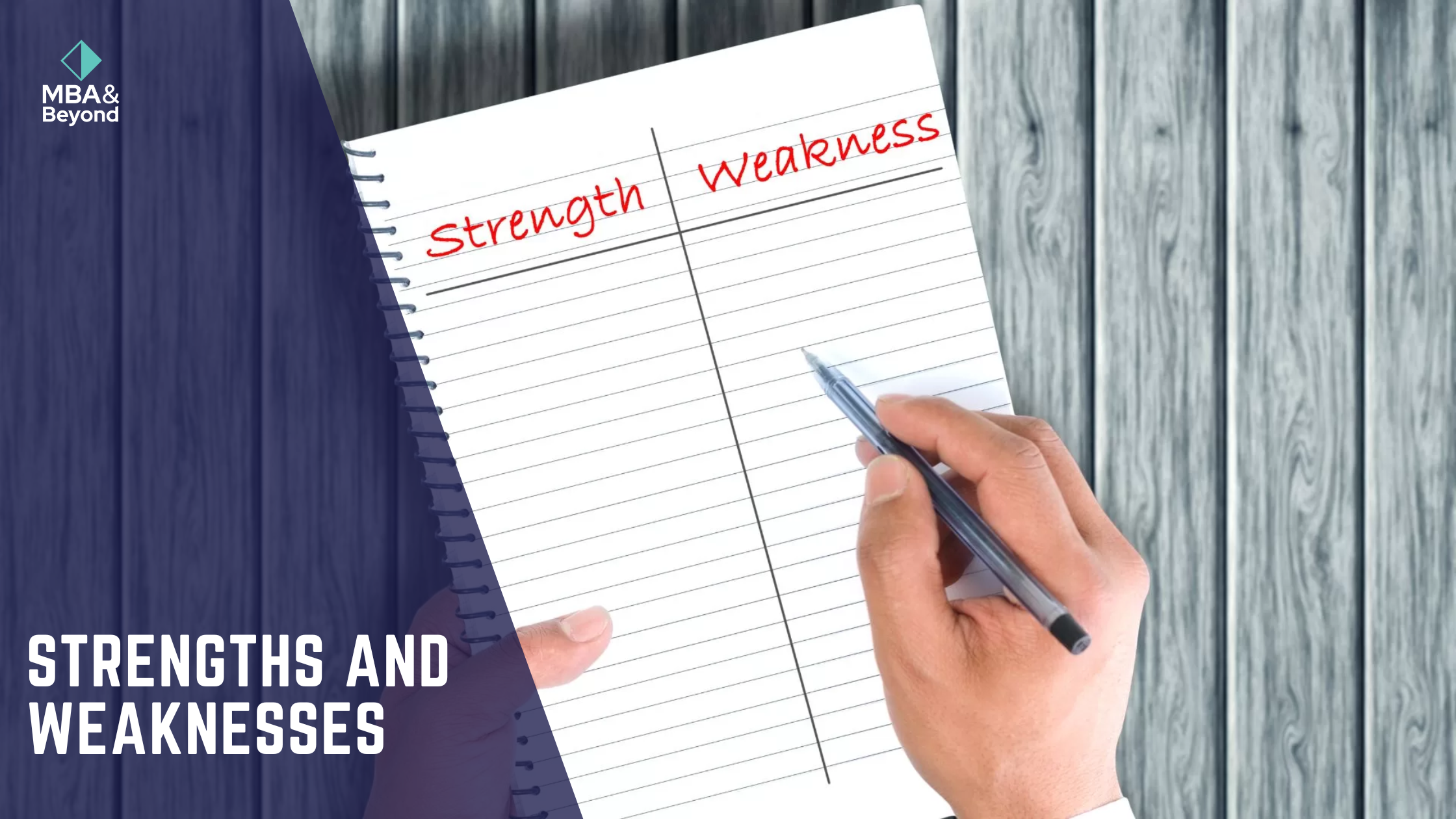Strengths and Weaknesses: Master Your MBA Application

Welcome to our guide on addressing “Strengths and Weaknesses” in your MBA application. As you embark on this crucial journey towards your business school aspirations, it’s essential to master the art of presenting your strengths confidently while candidly addressing your areas for growth. In this article, we’ll delve into strategies and insights to help you navigate this aspect of your application process effectively. Let’s unlock the potential of your candidacy together.
Writing an application includes your GMAT scores or GPA; it tells who you are as a person. Your Strengths and Weaknesses in an MBA application serve as indicators of your credibility and accountability in unfamiliar and challenging situations, a common and signature element of the business field.
Condensing all the essential dimensions into a few paragraphs and showcasing the “best” in you for the cause may appear daunting and exhausting.
But fret not!
This article will cover all the pertinent details to include and avoid when addressing your strengths and weaknesses essay in detail during the drafting of your B-school application.
Our bullet spells will help you succeed with flying colors. 😉
So, here’s your key tip for crafting a high-quality strengths and weaknesses essay for your MBA application.
Here Are Few Tips to Ace Your Strengths and Weakness Essay for Your MBA Application
What Are Your Strengths for an MBA
The question mentioned above is considered one of the most anticipated ones that nearly every MBA applicant needs to address, either within an essay or as a query for your recommenders.
“What are your strengths for an MBA?” may appear as a generic question, but the scope of knowing your “strengths for MBA application” and aligning them with the values that your target b-school holds can be a total game-changer!. World-class B-schools seek leaders, visionaries, and individuals capable of challenging established norms in the business world. It is crucial to demonstrate to the admissions committee that you embody these qualities by highlighting your strengths in your MBA application.
Strengths for MBA are easy; most of the top B-schools are looking for candidates with leadership qualities.
College administrations are aware that most candidates won’t have many significant accomplishments in terms of strengths for MBA early in their career. However, they seek qualities such as innovative vision, creativity, teamwork, and thoughtful curiosity in applicants.
Alongside implementing other general tips outlined in the article, ensuring that your strengths and weaknesses for MBA application complement each other effectively in your b-school essays is a strategic and wise move.
- Precision in your writing of Strengths and weaknesses essay
Be precise while introducing yourself or providing valuable details such as your GMAT/GRE Scores in your strengths and weakness essays.
Precision doesn’t entail portraying oneself as a ‘perfect candidate’; the objective should be to selectively highlight pertinent aspects, depicting oneself as a ‘credible candidate’ who pays attention to even minute details when conveying strengths and weaknesses for MBA applications.
- Creativity is the key to master strengths and weaknesses for MBA applications.
Well, it’s no secret that every B-school receives thousands of application letters every day so, what makes your letter unique among others?
Beyond professional certificates and test scores, the method of expressing your strengths and weaknesses for MBA applications plays a pivotal role in your selection.
Why would they accept your candidature? Everyone talks about their leadership experiences, accomplishments, social impact, etc. What will make you stand out?
To tackle such questions, position yourself as the protagonist when detailing your strengths for MBA. Make yourself the focal point. Mould your actions and experiences into a narrative that showcases your involvement in managing difficult situations while addressing your strengths and weaknesses essay. Add a touch of personality to infuse depth and flavor into your essay.

- Be Professional in your Strengths for MBA essay.
Remember that you are creating an application for a professionally-oriented B-school. Therefore, emphasizing strengths in your professional experience should be your primary focus.
It’s vital to underscore strengths for MBA that highlight your personality, but that’s the second step to consider. Initially, you must link your strengths for MBA to your professional life, future goals, and aspirations.
Weakness for MBA Application
When prompted to explore their weaknesses for MBA applications, candidates should ponder two fundamental questions before starting:
What should I avoid mentioning about my weakness for MBA interviews?
What is the college administration looking for in my strengths and weaknesses essays?
Answering these two questions clearly and earnestly will help you craft a thoughtful and compelling response that will enhance your strength and weakness for MBA application.
First, avoid mentioning weakness for MBA applications outside your academic or professional life as they aren’t relevant to your future career.
Crafting a weakness that logically aligns with your strengths is a strategic approach. It not only underscores your self-awareness but also showcases your leadership trait of recognizing areas for improvement. This method can be particularly valuable when addressing weaknesses for the MBA application and interview. The essence lies in establishing a connection between specific drawbacks and particular strengths in your weakness for the MBA application.
The college administration is seeking applicants with positive character traits such as self-awareness and self-assessment—someone who can interpret their shortcomings and improvise to develop them into potential growth areas.
Why Is Weakness a Strength
To answer this above question, here are some tips to address your “weakness for MBA application.”
- Personalize your weaknesses for MBA application:
Each candidate possesses their own set of shortcomings and weaknesses. Offering appropriate context for them in your strength and weakness essay enables the reader to comprehend the specific circumstances and envisage how you would handle similar situations as a student if admitted.
Leadership experience and potential are highly valued at business schools but may not be universally attainable. Instead, consider weaknesses for MBA as opportunities for growth and present them effectively in your strength and weakness essays.
- Be Honest
“The most crucial takeaway is to be honest.” Presenting specific flaws and addressing them sincerely in your weakness for MBA application essays will give you an advantage by allowing you to discuss the impact they’ve had on shaping who you are today. Every candidate has their own flaws, but not everyone will use them as an opportunity to reveal their true selves in their strengths and weaknesses for MBA application essays.
- Avoid counting too many weaknesses for MBA admission essays.
Avoid delving into excessive weaknesses; one or two examples will suffice. Instead, concentrate on sharing a genuine weakness in your MBA application. You can emphasize a specific area of knowledge, skill, or type of experience that you wish you had acquired based on your previous work. Furthermore, be sure to elaborate on your plans for skill development in your strengths and weaknesses essays. This approach will convey to the college admissions committee that you are actively addressing your areas of improvement, demonstrating your commitment to personal growth while acknowledging that nobody is flawless.
- Focus on yourself in your strengths and weaknesses essays
Instead of attributing blame to colleagues and the work environment, it is crucial to present proof of your capacity to identify the skills needed. Discuss the strategies employed in addressing these challenges in your strengths and weaknesses essays. Demonstrating self-awareness and self-assessment is essential to depict yourself as an applicant who acknowledges areas for improvement.
Strengths and Weaknesses Examples
Leadership qualities, intellectual appetite, self-introspection, and personal accountability are some prime qualities every B-school is looking for.
Feel free to narrate a success story! Sharing a success story is a fantastic method to highlight your decision-making and communication skills adeptly. Nevertheless, it is equally crucial to illustrate how you have actively enhanced these skills and your recognition of the necessity to incorporate additional skills into your skill set.
While discussing your strengths, always remember to follow a Problem, action, result approach!
- Mention the situation and your role
- Mention your action and how you utilize your skills to deal with the problem.
- Describe the result and how the situation turned out in favor of your company.
- Lessons you learned and how these skills will help you prosper in your future.
Lacking adequate knowledge in a specific domain can be a valid weakness. For instance, in your previous role as a Marketing Manager, limited exposure to the technical aspect of the business could be identified as an area for improvement. Subsequently, you can elaborate on your plans to enhance these skills.
The top B-school programs seek individuals with leadership qualities, visionary thinking, and an entrepreneurial spirit capable of challenging and shaping the future. It is crucial to convey to the admissions board that you embody these traits. With competition intensifying each day, securing a spot at the top business schools has become an increasingly challenging endeavor. Merely having good grades, certificates, and educational history is no longer sufficient for MBA applicants; they must possess additional qualities to gain admission.
While reviewing application essays, the admission committee seeks credible individuals poised for future impact. Hence, it is your responsibility to articulate your personal and professional narrative in a manner that engages the reader. You may think this means that you need to show them a history of spotless professional records, a flawless transcript, and a journey filled with success?
Of course not! If your story lacks failures or weaknesses, it may come across as lacking authenticity, and the admissions committee might perceive it as if you haven’t fully contemplated their application questions.
Every individual has experienced failure at some point, and such setbacks can serve as a dual advantage for your application. They not only showcase the capacity for self-introspection, a rare leadership trait, but also provide an opportunity to outline your action plan for future endeavors.
How to Communicate Your Strengths and Weaknesses for an MBA Interview to the Adcoms
The first and foremost step is to be perfectly honest, don’t try to outplay the interviewer by marking your strengths as your weaknesses.
Ensure that any strength you highlight incorporates qualities that B-schools specifically value. Avoid presenting yourself as perfect, as it implies there’s nothing left to learn, and this impression may not be well-received by the Adcoms.
Self-introspection is valuable, but it doesn’t necessitate tearing yourself down. Limit your weaknesses to one or two at most. Simply stating your weaknesses is not sufficient; provide a logical foundation linked to your future goals. Question why you believe a particular aspect needs change and consider how this transformation can contribute to your personal growth.
If you’re still seeking further guidance on how to prepare your strengths and weaknesses for an MBA interview, join us for a call! Our 45-minute in-depth consultation will assist you in overcoming any challenges encountered during interview preparation.
Frequently Asked Questions
01.
How can I make my MBA application strong?
Rather than making your strengths and weaknesses for MBA application exhaustive detail-wise, try to make it more genuine by focusing on strengths for MBA relevant to your future goals and how admission to your dream school will help achieve them.
Precision, creativity, honesty, and professionalism are the major aspects of drafting a near-perfect strengths and weaknesses essay for an MBA application.
02.
How can you justify your strengths?
Ensure that your certificates, academic background, and prior work experience seamlessly align with the highlighted strengths for MBA. The college administration recognizes that noteworthy achievements at a young age are uncommon, making them particularly interested in individuals with vision, creativity, and strong leadership skills.
03.
What should I write about my weaknesses in MBA?
Crafting weaknesses for MBA essays can be challenging, but to prevent misinterpretation, focus on offering logical weaknesses tied to your profession. However, refrain from listing too many in your MBA application essays; limit them to two or at most three. Additionally, keep in mind that the capacity for self-criticism and introspection is a valuable leadership trait, and it’s relatively rare among B-school applicants.




Leave a Reply